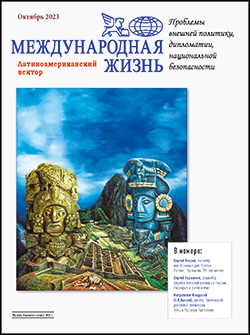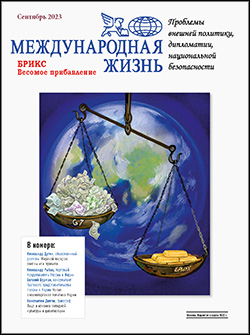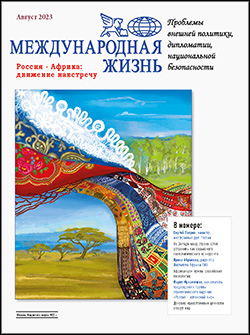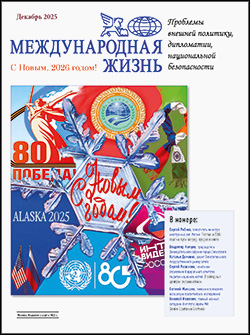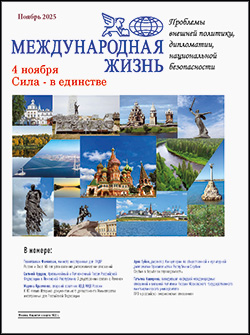Mikhail Taratuta
American аbsurdities
The motivation of the war of black activists and the left-liberal public with monuments to Southerners who fought in the Civil War for secession from the United States can be understood to some extent. But when the protesters got to Columbus, and then to the monuments to the founding fathers - J.Washington and T. Jefferson, other prominent presidents - W. Grant, A. Lincoln, T. Roosevelt, and then before the traditional image of Christ with a white face, it is already worth seriously thinking about.
Keywords: USA, elections, liberal dictatorship, BLM movement, race riots
CHANGE OF ERA
Artur Bogachev, Vitaly Chumakov
The non-aligned status of the united Germany is a missed chance
On October 3, 2020, Germany, as a leading European member of the North Atlantic Alliance, celebrates 30 years since the completion of the unification process of Germany and the GDR. From the documents recently declassified by the US State Department, it follows that the fate of both the German people and the North Atlantic Pact was decided in 1990 during negotiations between Soviet President Mikhail Gorbachev and his Western partners on the unification of Germany.
Keywords: international negotiations on the unification of Germany, NATO enlargement, the "two plus four" treaty, Cold War, Mikhail Gorbachev
Alexander Rahr
Now there is no "sacred goal" in Germany's relations with Russia
The Charter of Paris was signed on the eve of the collapse of the USSR and the Warsaw Pact. In practical terms, it was supposed to revive a new, "free" Europe based on the OSCE. But the United States has made every effort to ensure that the future architecture of Europe is built by the institutions of NATO and the European Union. And it turned out that the West became a teacher of democracy, and Eastern Europe sat on the school bench to learn the basics of democracy.
Keywords: Russia, Germany, European Union, Treaty 2+4
MOSCOW DIPLOMATIC CORPS
Andreas Zinonos
Cyprus - Russia: 60 years of friendship and cooperation
This year marks the 60th anniversary of Russian-Cypriot diplomatic relations. It should be noted that they are much older - at the official level, our countries have been interacting since the XII century. It is important that today we are united by strong spiritual and cultural ties, which are highly valued and preserved by both Russia and Cyprus.
Keywords: Russia, Cyprus, diplomatic relations, 60 years of friendship and cooperation
HUMANITARIAN VECTOR
Olga Lebedeva
Conceptual foundations of Russia's cultural policy at the present stage: main goals and objectives
Consideration of cultural policy should be carried out in the context of the relationship of the cultural sphere of society with the political strategy followed by the Government of the country concerned. Of course, socio-cultural aspects conditioned by history have a significant impact on the political course.
Keywords: cultural policy of Russia, human and social capital, IT-developments, cultural scientists, marketing approaches
Vyacheslav Sutyrin
Beyond Soft Power: humanitarian influence and cooperation in foreign policy
The term "soft power", like "public diplomacy", is an "invention" of the English-speaking space, primarily of the American academic and foreign policy communities. A more accurate translation of the term J.Naya is "soft power" (in English, "power" is also a translation of Weber's "power"), which is defined as achieving that an object acts in the interests of the subject, but without "tangible impact".
Keywords: "soft power", power, humanitarian influence, humanitarian policy, infrastructure, foreign policy
CURRENT HISTORY
Dmitry Malyshev
Transnistrian conflict and settlement issues
Having originated 30 years ago, in the era of the already disintegrating USSR, the Transnistrian conflict is still far from being resolved. The main aspects of its development and the influence on it from the main players of modern international relations - Russia, the European Union, NATO, the USA, the OSCE - remain relevant, their vision and approaches to its resolution.
Keywords: "soft power", power, humanitarian influence, humanitarian policy, infrastructure, foreign policy
Konstantin Voronov
Sweden in the Second World War and the Cold War: another story
The uniqueness of such a small original country as Sweden is certainly manifested in many ways. The main thing is her special national-historical experience, which testifies, in particular, that she managed not to allow herself to be dragged into either the meat grinder of the Second World War or the "cold" one that followed it.
Keywords: Sweden, USSR, World War II, Cold War, neutrality
Alexander Frolov
Russia and the West: neighbors are not chosen, or Geography as a verdict
The topic of the correlation between Russia and the West, raised by the author of the book "Russia and the West: A Failed Alliance, or Confrontation as an Inevitability", Professor of the Diplomatic Academy of the Ministry of Foreign Affairs of the Russian Federation V.V.Stolem, is obviously actualized in the year of the celebration of the 75th anniversary of Victory in the Great Patriotic War, since its content is addressed specifically to the history of European contradictions and their concretizationin certain actions (wars, coalitions, intrigues, checks and balances).
Keywords: Russia, USSR, West, NATO, USA, Germany, British-German contradictions, resource bases, World Wars I and II, alliances and coalitions, Ost plan, Germanization, Molotov-Ribbentrop Pact, consequences, countries of people's democracy, perestroika, pan-European house
Economy
Alexander Rybas, Vyacheslav Bessonov
Prospects for the development of trade and economic cooperation between Russia and India in terms of overcoming the consequences of COVID-19 coronavirus infection
India's experience in controlling the spread of COVID-19 with its almost one and a half billion population with imperfect infrastructure, serious problems with the quality of drinking water and sanitation, without exaggeration, can be called unique. However, we will make a reservation that, until the wave of the pandemic has entered a controlled channel, it is still too early to unequivocally judge what measures or objective conditions have been taken to reduce the density of infection and the number of deaths.
Keywords: Russia, India, trade and economic cooperation, COVID-19
MILESTONES OF HISTORY
Yuri Bulatov
Russification of Bessarabia: the failed project of the Romanov House (1828-1917)
In February 1828, Emperor Nicholas I interrupted the experiment with the autonomous device of the Pruto-Dniester region by signing the bill "Institution for the administration of the Bessarabian region". Instead of the former "rights and freedoms" granted to the local elite by Alexander I, his successor on the Russian throne granted Bessarabia the status of a region as part of the Novorossiysk-Bessarabian Governor-General - a new administrative-territorial unit created in the south of Russia
Keywords: Pruto-Dniester interfluve, Moldovans, Southern Bessarabia, Alexander II, NRC, ROC
Читайте другие материалы журнала «Международная жизнь» на нашем канале Яндекс.Дзен.
Подписывайтесь на наш Telegram – канал: https://t.me/interaffairs

 14:24 26.09.2020 •
14:24 26.09.2020 • 